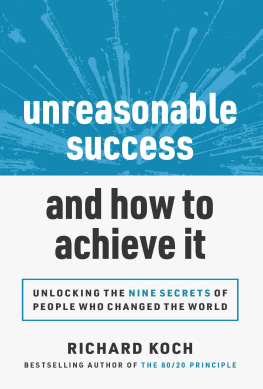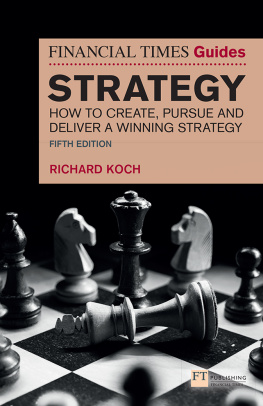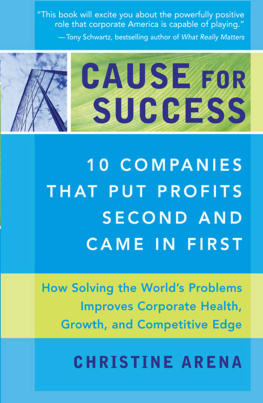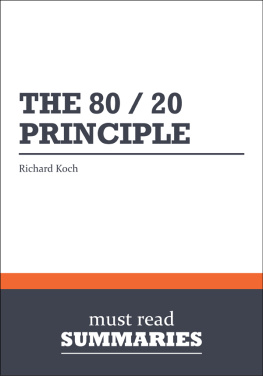Table of Contents
About the author
Richard Koch has made a huge fortune, many times his original investment, from the companies he has started, turned around or helped expand dramatically: they include Filofax, Belgo Restaurants, Plymouth Gin and Betfair - Europes largest and most profitable internet gambling business.
He is also the author of a number of acclaimed business books, including The 80/20 Principle , which has sold over 700,000 copies worldwide and been translated into twenty-four languages.
The Star Principle
RICHARD KOCH
Hachette Digital
www.littlebrown.co.uk
Published by Hachette Digital 2010
Copyright 2008 by Richard Koch
The moral right of the author has been asserted
All rights reserved
No part of this publication may be reproduced, stored in a retrieval system, or transmitted in any form or by any means, without the prior permission in writing of the publisher, nor be otherwise circulated in any form of binding or cover other than that in which it is published and without a similar condition including this condition being imposed on the subsequent purchaser
A CIP catalogue record for this book
is available from the British Library
eISBN : 978 0 7481 1812 0
Edited by Andrew John
Hachette Digital
An imprint of
Little, Brown Book Group
100 Victoria Embankment
London EC4Y 0DY
An Hachette Livre UK Company
For Matthew and Tocker,
with special thanks to Rhona and Charles
acknowledgements
I have lived with the ideas for this book since I started working with the Boston Consulting Group (BCG), what seems a lifetime ago. The work is a fusion of my first life as a strategy consultant, my second as an entrepreneur and investor, and my third as an author. In one sense, therefore, I should thank my thousands of former colleagues and clients for their insights.Yet the idea of the star business, in all its stark magnificence, can be attributed to one person, Bruce Henderson, founder of BCG, and perhaps the most influential business thinker of all time. I had the uncertain privilege of knowing and talking to Bruce when he was an extremely Big Cheese and I was the most junior of colleagues; it was typical of Bruce that he would talk to anyone who was interested in his ideas, and although conversations with Bruce were always challenging he made you think very hard.
For helping me develop my ideas about star ventures I owe a great debt to my former partners, Iain Evans, Jim Lawrence, and Peter Johnson in LEK, and Robin Field, Anthony Rice, Nick Dodd, and Jamie Reeve in SVP.
The idea for the book came from discussions with Nicholas Brealey and Sally Lansdell; all power to them. Fiona Lindsay did a terrific job as agent for this book and its predecessor, assisted by the excellent Mary Bekhait. Thanks also to my wonderful editorial committee of friends - Mary saxe Falstein, Martin Nye, Robin Field, Jamie Reeve, Peter Johnson, Rick Haller, Chris Outram, Anthony Rice, Chris Eyles, Graham Ross Russell and Matthew Grimsdale. Douglas Blowers created the illustrations with great skill and, as always, Aaron Calder provided essential all-round help. At Piatkus, Alan Brooke and Denise Dwyer have been a joy to work with.
Finally, thanks to all the entrepreneurs who made all this possible, in particular David Collischon, Robin Field, Andr Plisnier, Denis Blais, John Murphy, Charles Rolls, Andrew Black, Edward Wray, Iain Evans and Jim Lawrence. Several of these commented on the text and Andr, David and Charles went to extraordinary lengths to ensure that the pieces on their companies were accurate. All inadequacies are, beyond doubt, entirely mine.
I must create a system or be enslaved
by another mans.
I will not reason and compare;
my business is to create.
WILLIAM BLAKE
One cannot resist the invasion of ideas.
VICTOR HUGO
introduction
La Dolce Vita for You?
I n the late 1990s, Andrew Black, known as Bert to his friends, had an idea. As a former professional gambler, he liked nothing more than playing poker through the night, and the thing he liked most about poker, apart from winning, was that the game was free. There were no bookmakers around to slice off their huge margin. Collectively, the friends he played with broke even. If one lost, somebody else won. But, when it came to horseracing and other sports, there was no way that individuals could exchange bets or avoid paying a kings ransom to third-party bookies.
Unless Bert did something about it. Which he did. Together with the brother of a friend, Bert started a betting exchange called Betfair. A betting exchange acts as a broker between individuals, charging a very small commission for doing so, a tiny fraction of what the bookies charge when they set the odds.
Betfair was started in September 2000 with about 1 million dredged up from friends and family - no venture capitalist would invest in it. By the start of 2001, Betfair was a tiny business that was running out of cash fast. Despite its precarious prospects, and its failure to make much headway in the betting world, I was delighted to invest 1.5 million in Betfair. I didnt need to think much about it, because Betfair was a particular type of business, one that the Boston Consulting Group terms a star business.
(Ill explain in the next two chapters what a star business is. Just trust me for the moment - you can easily recognise a star business when you see one, and starting one is quite possible, too, if you know exactly what you are aiming for.)
Why should you care about this? Because today Bert Black and his co-founder, Ed Wray, have each made several hundred million pounds from Betfair, and it may well eventually make them billionaires; and because I struck gold, too, even though I was not a founder or even a founding investor. My first investment - a few months after the company started - has multiplied 53 times. In total Ive made more than 100 million from Betfair.
Betfair is not an isolated example. Ive made four other investments in star businesses, only one of which I co-founded and worked in. Ive made millions out of each one, in total 10 times what I put in (the simple average was sixteen times). The founders profited more. Even ordinary employees made out like bandits. We all benefited hugely from being involved in the early days with a star business.
Why should you care? Because you too can make a lot of money and have great fun, just by doing the same. Whether you want to start a firm or not, whether or not you have savings to invest, a star business can make your life much sweeter, richer in every way. Let me repeat: this applies even if you are a normal employee, not an entrepreneur or a moneybags.
You could stop reading here. You could pass up the chance to transform your life. Maybe you dont need or want a richer life. But Ill make you two promises, which Ill keep.
1. This book is easy to read and assumes no special knowledge about business.
2. If you act on what I say, your magical mystery tour of the star world will make you more confident, more useful and a lot wealthier.
part one
the idea
What will make you successful?
To know much is not to be wise.
Euripides
Imagine that there was a business you could work in, where you would be somebody important; where you could have several times the influence and fun that you could expect in a normal firm; where you would be paid more, get great bonuses and perhaps qualify for free shares that could become valuable.







